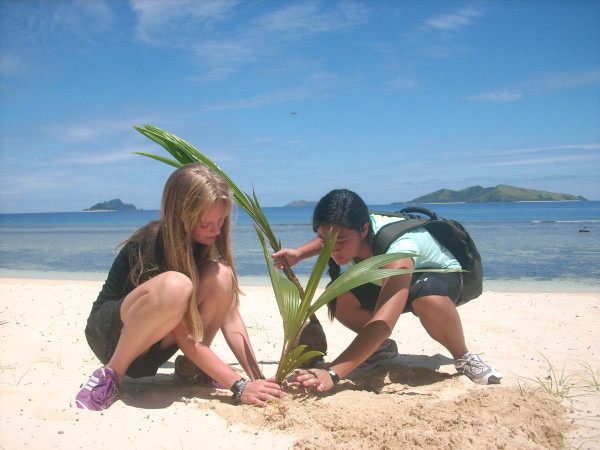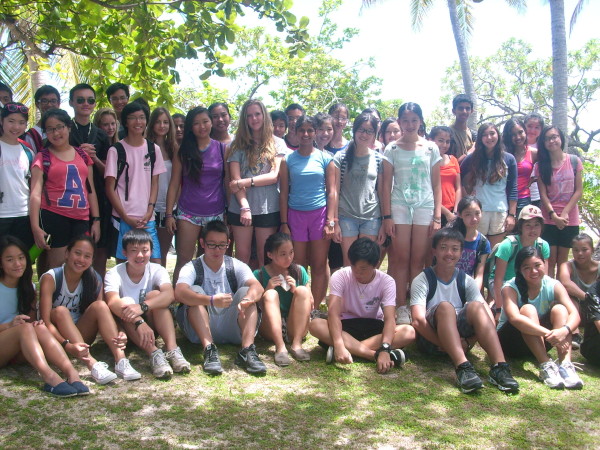Mana Island Resort hosted a group of students from Hong Kong over the weekend and had them engaged with few environment events. With a total roll of 56 students, they were surely the loudest group engaging with activities around the island. Upon arrival, they were greeted with a big BULA by the hotel management and staffs. They were also provided with refreshments before they were seated inside the conference room for briefing.
Spending their first time on the island, the students did not waste a second upon disembarking from the MV Tiger IV as they took pictures of the beautiful settings of Mana Island and sighing signs of relief breathing in the fresh breeze of the Mamanucas. They all looked very happy especially after long flights and connect transfers from destinations to destinations till they finally set foot on the island. The students could not wait to get into the water and feel the experience of a typical Fijian luxurious island getaway.
MES facilitated on the environmental aspects of their tour. Project Officer, Soropepeli Seru talked to the students on environment awareness and conservation of marine ecosystem. He stressed the importance of keeping the marine environment healthy as it holds one of the world’s unique and oldest structures which is coral reefs. Facing threats from natural and human impacts, coral reef is the oldest natural formation and also the most diverse and beautiful of all marine habitats. However, the health system of coral reefs around the world today is at risk and in danger of being lost forever.
The students got to understand how all these impacts have been affecting tiny islands like Fiji and other Pacific islands who have some of the world’s most diverse underwater community. From seeing pictures of corals being damaged and directly affected by human and natural activities explained in the presentation, the students were then led to an on site coral planting exercise.. Interestingly, coral planting is a principal technique used by MES in the course of trying to keep the world’s oldest underwater structure safe and increasing its quantity especially in the Mamanucas. Students got involved in the process laying hands planting corals and also accompanying staffs to the sea where the coral table was placed underwater nursery for growth. As normal procedure, this table will be left out in the nursery for a seven months maximum before the corals are transplanted from the table to the natural reef substrate.
The next day kicked off with an early start, hiking up to Look out point before daybreak, to capture the sunrise. Returning from Look out Point, the students headed for breakfast. After breakfast the students gathered at the North beach bure to begin the days program. Starting off with a beach clean up, the students collected mostly debris and plastic at the South beach towards the honeymoon bures, exercising sorting of rubbish on site. At the completion of the beach clean up, MES facilitating Officer Miss Filomena Serenia, highlighted the importance of proper solid and waste disposal, and the effects of improper waste disposal on water quality and coral reefs. On the way from the honey moon bures to the turtle pond, students learnt of Fijian medicinal plants. At the turtle pond, Miss Serenia explained to the students the biology and ecology of sea turtles and their importance to the Fijian culture and traditions, Miss Serenia then proceeded to talk about the MES turtle conservation project in the Mamanucas.
Leaving the turtle pond, the group headed for the resort plant nursery to collect seedlings for tree planting. A pleasant surprise was awaiting the group, the students got to see one of Fiji’s endangered species, the Fiji Banded Iguana. The young banded iguana was just found that morning perched on a beach hibiscus plant, according to the staff of the resort; this was the first ever to be found on Mana.
With the excitement of the new found iguana still riding high, the students eagerly made their way to the north beach to plant coconut trees and also mango trees which are planted a few feet inland from the beach.
The tree planting marked the end of the program, and also instilled in the students a sense of ownership to something they can always return to and call their own, on their next visit. The students, teachers and facilitator all posed for a group shot before dispersing for lunch.



